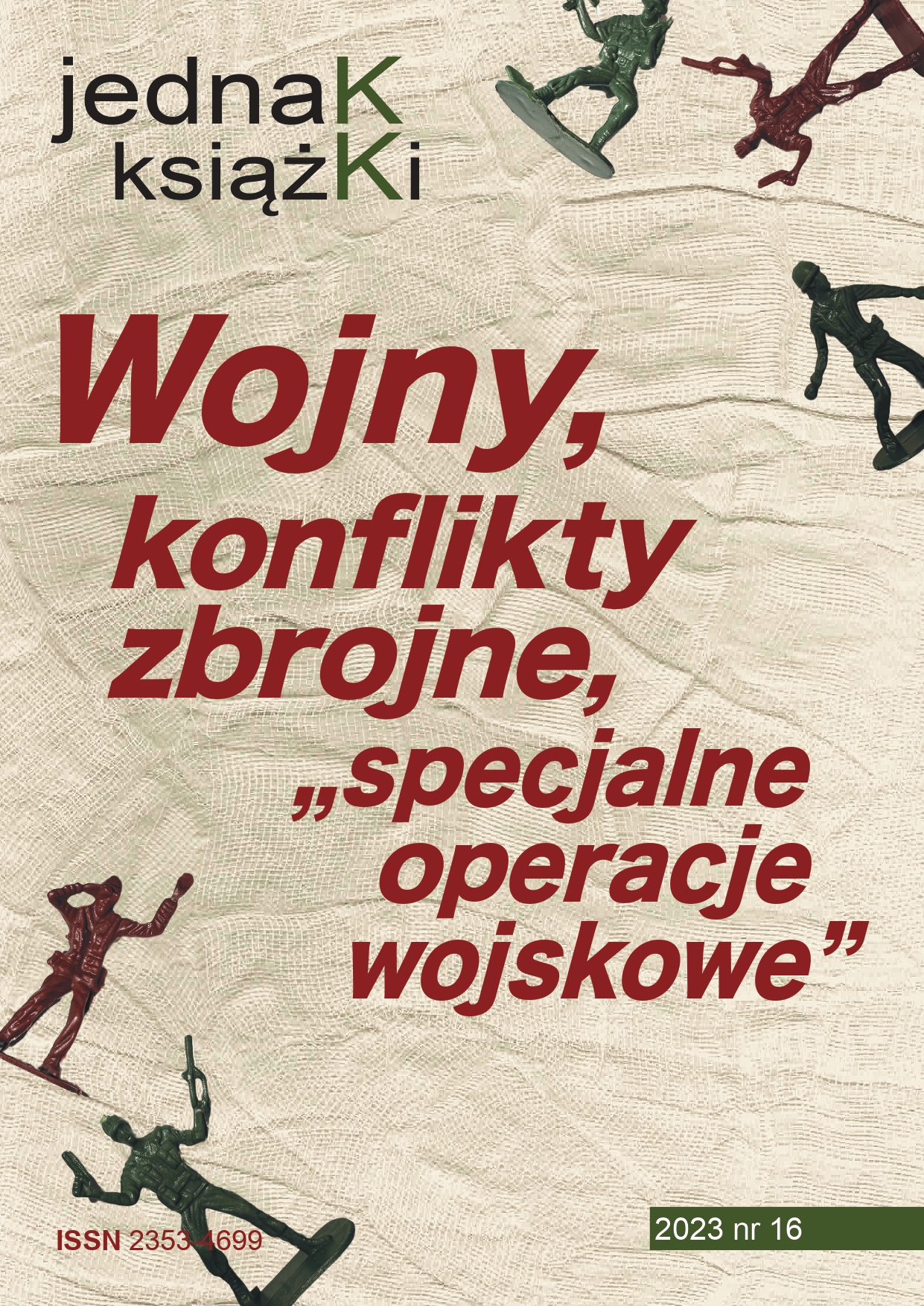Przemoc zwielokrotniona. Wokół izraelskiego serialu pt. „Fauda”
DOI:
https://doi.org/10.26881/jk.2023.16.09Słowa kluczowe:
Fauda, TV series, Israel, Palestine, conflict, terrorism, violenceAbstrakt
One of the most discussed TV series of recent years is Fauda (directed by A. Issaharoff and L. Raz). In the article, I discuss the reception of the film in the Israeli and Western media, as well as the ways of representing the Israeli-Palestinian conflict in the series in the context of the so-called war on terrorism and forms of violence. In my work, I am particularly interested in the following questions: in what form did the idea of conflict return to the screens and to the public debate? How has the Palestinian issue been marginalized in the Israeli public consciousness? Under what conditions does the violence intensify? Taking into account the forms of violence presented in the series, I am inclined to the thesis that the creators of “Fauda” are trying, sometimes with greater, sometimes less success, to look critically at the reality dictated by the laws of war.
Downloads
Bibliografia
Ahronheim A., Israel tried to kill Hamas chief Mohammed Deif twice in Gaza operation, „The Jerusalem Post” 19.05.2021, https://www.jpost.com/middle-east/israel-still-trying-toeliminate-hamas-chief-mohammed-deif-in-gaza-668496 [dostęp 06.04.2022].
Ajjour M., In Photos: This is How Palestinian Actors in Gaza are Responding to Israel’s „Fauda”, „Palestine in Chronicle” 04.02.2022, https://www.palestinechronicle.com/in-photosthis-is-how-palestinian-actors-in-gaza-are-responding-to-israels-fauda/ [dostęp: 25.04. 2022]. 08.05.2015, “Maariv „,דחוימ ןויארב הרדסה ירצוי ?"הדואפ" לע סאמחב םיבשוח המ :םישקובמ .,A .T Amir https://www.maariv.co.il/culture/tv/Article-476302 [dostęp: 05.06.2022].
Asad T., Terroryzm, przeł. Sławomir Królak, „Praktyka Teoretyczna” 4, 26, 2017.
Bieńczyk-Missala A., Grenich P., „Międzynarodowe prawo humanitarne w świetle współczesnych konfliktów zbrojnych”, w: Stosunki międzynarodowe w XXI wieku. Księga jubileuszowa z okazji 30-lecia Instytutu Stosunków Międzynarodowych Uniwersytetu Warszawskiego, red. E. Haliżak i in., Warszawa 2006.
Deflem M., „Yehida Mishtartit Mistaravim (YAMAS) (Israel)”, w: Counterterrorism: From the Cold War to the War on Terror, red. F. G. Shanty, t. 2, Santa Barbara, 2012, s. 71–72, https://www.researchgate.net/publication/331305570_Yehida_Mishtartit_ Mistaravim_YAMAS_Israel [dostęp: 20.02.2022].
Hamas TV series glorifies fight against Israel, but it’s no „Fauda”, „The Times of Israel”, https:// www.timesofisrael.com/hamas-tv-series-glorifies-fight-against-israel-but-its-no-fauda/ [dostęp: 20.06.2022].
Helman A., „O samotności, polityce i cytrynach. »Drzewo cytrynowe« Erana Riklisa”, w: Współczesne kino izraelskie, red. J. Preizner, Kraków–Budapeszt 2015.
Kohn E., „Fauda” Review: Netflix’s Thrilling Israeli Spy Show Matures Into Ambiguity During Season 3, „IndieWire” 21.04.2020, https://www.indiewire.com/2020/04/fauda-reviewseason-3-netflix-1202226425 [dostęp 14.02.2022].
Lavie N., Jamal A., Constructing ethno-national differentiation on the set of the TV series, „Fauda”, „Ethnicities” 2, 19, 2019.
Mbembe A., Polityka wrogości. Nekropolityka, przeł. U. Kropiwiec i K. Bojarska, Kraków 2018.
Melhem A., Hamas looks to push its own narrative with new series to rival „Fauda”, „AlMonitor” 30.01.2022, https://www.al-monitor.com/originals/2022/01/hamas-lookspush-its-own-narrative-new-series-rival-fauda#ixzz85llDQOJc [dostęp: 25.04.2022].
Oficjalna strona Liora Raza: https://www.liorraz.co.il/ [dostęp: 15.05.2023].
Organizacja BDS: https://bdsmovement.net/what-is-bds [dostęp 14.02.2022].
Porat I.B., Soffer A., Hamas Confirms: Mohammed Deif is Still Alive, „Arutz Sheva” 20.07.2014, https://www.israelnationalnews.com/news/184241#.U_TTyU3D-Uk [dostęp: 06.04.2022].
Pitrus A., „Słoneczniki przeciw czołgom. »Liban« Samuela Maoza”, w: Współczesne kino izraelskie, red. J. Preizner, Kraków–Budapeszt 2015, s. 47–58.
Profil Aviego Issacharoffa na stronie „The Times of Israel”: https://www.timesofisrael.com/ writers/avi-issacharoff/ [dostęp: 24.02.2022].
Ribke N., „Fauda” television series and the turning of asymmetrical conflict into television entertainment, „Media, Culture and Society” 2019, s. 1–16, https://www.academia. edu/38366451/Fauda_television_series_and_the_turning_of_asymmetrical_conflict_ into_television_entertainment [dostęp: 20.03.2022].
Saab S.F., Hamas Fights Back Against Netflix With „Fauda”-style Palestinian TV Series, „Haaretz” 21.01.2022, https://www.haaretz.com/middle-east-news/palestinians/2022-01-21/tyarticle/.premium/hamas-fights-back-against-netflix-with-fauda-style-palestinian-tvseries/0000017f-f2fb-d487-abff-f3ffe0ab0000 [dostęp: 25.04.2022].
Sof E., IDF Mistaravim (YAMAS), „Special-ops”, https://special-ops.org/idf-mistaravimyamas/ [dostęp: 24.02.2022].
Stern I., BDS Movement Urges Netflix to Drop Fauda for „Supporting Israeli Occupation and Apartheid”, „Haaretz” 29.03.2018, https://www.haaretz.com/israel-news/ 2018-03-29/ty-article/bds-urges-netflix-to-boycott-fauda-for-supporting-israelioccupation/0000017f-e0a7-d568-ad7f-f3ef989b0000 [dostęp 14.02.2022].
Swissa E., „Fauda” becomes first Israel TV show to be dubbed in Farsi, „Jewish News Syndicate”, https://www.jns.org/fauda-becomes-first-israel-tv-show-to-be-dubbed-in-farsi/ [dostęp: 25.04.2022].
Wayne M.L., Sandoval Uribe A.C., Netflix original series, global audiences, and discourses of streaming success, „Critical Studies in Television” 18, 1, 2021, s. 81–100, https:// journals.sagepub.com/doi/10.1177/17496020211037259 [dostęp: 25.06.2023].
Wielewska-Baka, M., Anatomia nieobecności. Konflikt izraelsko-palestyński w mediach i w polityce, Gdańsk 2023.
Żyto K., „W poszukiwaniu transgresji. »Walc z Baszirem« Ariego Folmana”, w: Współczesne kino izraelskie, red. J. Preizner, Kraków–Budapeszt 2015.

 Uniwersyteckie Czasopisma Naukowe
Uniwersyteckie Czasopisma Naukowe





